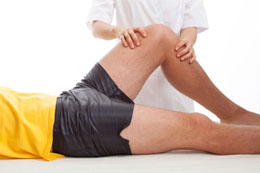The recovery time for a dislocated knee may be about 3-5 months depending on the severity of the condition. It also depends on the treatment measures as well.

By dislocated knee it means that the knee-cap has been dislocated due to a sharp, hard blow. The knee gets dislocated due to a variety of reasons. The most common cause a crushing, forceful blow. People involved in car accidents and bike accidents get a dislocated knee. The second reason is when it twists and the quadriceps muscles contract at the same time. Another rare case of dislocation may occur, when you get hit on the outer part of your knee very hard. Thus, we can imagine that people playing contact sports must be dealing with this problem a lot. But the problem is not always restricted to sportsmen. One bad, heavy landing, and who knows, it could happen to anyone.
Recovery Time
Dislocated knee recovery happens over two stages. The first stage is protective rehabilitation. In this stage, the objective is to ensure that the damage is reined in, and further damage is prevented. The knee is quite weak and hence activities must be kept to a minimum. This stage could take about 3-5 weeks.
The second stage is the rebuilding and strengthening stage. This recovery time could last from 2-4 months. It is necessary that you do not rush the treatment and remain patient, otherwise you may end up damaging it even more. Your physiotherapist will prescribe certain exercises and physical therapy which will help rebuild your muscles and tissues and bring your flexion into the normal range. Thus, we can see that the cumulative recovery time is about 3-5 months. Another thing to know is during your recovery, you will most likely have to wear an open patella brace every time you head out of your home. It also means no sports, no brisk walking/running and a constant watch over how much stress your knee comes under.
How to Know if You Have Dislocated Your Knee
The most common pointer is that the patella comes unstuck from the rest of the leg and it
looks like it's out of the right spot. Secondly, as the patella comes out, it take a few tissues out with it. This will cause some swelling on the leg as well. Other signs and symptoms include a feeling of instability in the knees and 'popping'.
Immediate Treatment Plan
As soon as you realize that you have dislocated your knee, go for RICE: rest, ice, compression and elevation.
• The first one is quite obvious. It is essential to rest the knee and make sure that there isn't much work for it.
• Second, apply ice to the injury to make sure that the swelling reduces.
• Third, compress the knee with a brace to make sure that the patella doesn't come out of place, and is close enough for the tissues to rebuild and grip the knee-cap again.
Note:
If you are not sure about this step, then it is better to wait until you seek a doctor's help.
• And fourth, keep the leg at a level that is higher than that of the heart. For this, you can place your knee on a pillow or two.
Diagnosis
It is essential that the dislocation is diagnosed so that the treatment can start right away. A dislocated patella moving in and out of the grooves will create much more damage to the tissues and the muscle structures around it.
It is not too hard to diagnose a dislocated knee. Straighten the leg so that the patella doesn't pop up and down in the grooves. You should visit a doctor. The doctor will take an X-ray to assess the extent of the injury and whether there has been any damage to the patella. Usually the doctor prescribes a brace to be strapped around the knees which will keep the patella in place and minimize the pressure.
It is essential that the person suffering this problem is patient and does not rush through the treatment. Each body is different and takes its own time to recover from injuries like this.
Disclaimer:
The information provided in this article is solely for educating the reader. It is not intended to be a substitute for the advice of a medical expert.


 By dislocated knee it means that the knee-cap has been dislocated due to a sharp, hard blow. The knee gets dislocated due to a variety of reasons. The most common cause a crushing, forceful blow. People involved in car accidents and bike accidents get a dislocated knee. The second reason is when it twists and the quadriceps muscles contract at the same time. Another rare case of dislocation may occur, when you get hit on the outer part of your knee very hard. Thus, we can imagine that people playing contact sports must be dealing with this problem a lot. But the problem is not always restricted to sportsmen. One bad, heavy landing, and who knows, it could happen to anyone.
By dislocated knee it means that the knee-cap has been dislocated due to a sharp, hard blow. The knee gets dislocated due to a variety of reasons. The most common cause a crushing, forceful blow. People involved in car accidents and bike accidents get a dislocated knee. The second reason is when it twists and the quadriceps muscles contract at the same time. Another rare case of dislocation may occur, when you get hit on the outer part of your knee very hard. Thus, we can imagine that people playing contact sports must be dealing with this problem a lot. But the problem is not always restricted to sportsmen. One bad, heavy landing, and who knows, it could happen to anyone.